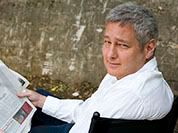Facing the Health Care Crisis
By Christopher Truscott
Only the war in Iraq is a more pressing issue than America’s health-care crisis.
With 47 million of our countrymen and women going uninsured, including many who are working at least one job, this is a real crisis. No hyperbole needed. Fill a room with 100 randomly selected Americans and you’ll have about 16 who lack access to basic, affordable medical care. That can’t be explained away as a statistical glitch. It’s a sad truth and a major problem.
Running for president in 2008 without a plan to fix health care – that is, to ensure that every American has access to it, universal coverage – would be like seeking appointment as the commissioner of the Minnesota Department of Transportation and having no plans for plowing the roads clear of snow in the winter. You’d rightfully be laughed out of the room.
Health care is an inescapable question in the great debate this country deserves. We’ve dodged the issue for too long with half-measures, watered-down compromises, state-by-state solutions and timid thinking. It’s time to tackle this problem with the full force and resources of the American government and those who seek to lead it.
At a health-care forum in Nevada last weekend, Democrats talked about the issue. The two front-runners in the race, however, give us little reason for optimism.
Sen. Barack Obama boldly proclaimed that he’ll do “whatever it takes” to insure everyone, but stopped short of telling us what it will take. If he wants to get beyond the criticism of his depth as a candidate – that he’s a stuffed shirt with a nice smile – he’ll have to come up with a better answer.
Sen. Hillary Clinton said it will take a “movement” to make health care “the number one voting issue in the ’08 election.” Quick question, senator: Aren’t we there? We talk about a divided country, red and blue, but health care transcends party lines. Roughly 16 percent of Americans are uninsured and they live in Republican states like Mississippi and Democratic states like the former first lady’s New York. The forces of bad luck and economic duress have created a constituency that’s desperately waiting for a leader.
Of the major candidates seeking the Democratic Party’s nomination, only John Edwards has articulated a plan to grant health care access to all Americans. Through a combination of government programs, market competition and federal regulation, Edwards’ plan would cover everyone by 2012.
Is it the best option? We can’t be sure because we only have one on the table, but the former North Carolina senator’s proposal is promising, especially since he’s cleared the hurdle of admitting that bold change won’t come without a price. He’ll pay for his plan by rolling back the Bush administration tax cuts on the wealthiest Americans.
That’s the kicker. Health care is expensive and insuring everyone will cost money. Call it “investment” or “dedicated revenue,” it doesn’t matter. It’s going to take cash to close the growing health care gap.
Shortly before the American Revolution, Virginia patriot George Mason wrote of the need for joint sacrifice in the face of a shared problem.
“Every member of society is … duty bound to contribute to the safety & good of the whole; and when the subject is of such importance as the liberty and happiness of a country, every inferior consideration, as well as the inconvenience to a few individuals, must give place to it; nor is this any hardship upon them; as themselves & their posterity are to partake of the benefits resulting from it.”
That Mason was describing the effect on the colonies of an economic boycott of British goods in opposition to royal oppression is irrelevant. The sentiment is just as pertinent now as it was more than two centuries ago.
We all share in the cost of health care. If you have insurance, you’re already paying for the coverage of those who don’t. When someone without health insurance gets sick, they forgo a trip to the doctor. When it gets worse they end up in a costly emergency room. When they can’t pay the bill it gets passed onto to your insurance company, who in turn passes it to you in the form of sky-rocketing premiums. Finally, the rising price of insurance then forces more people into the ranks of the uninsured and the cycle continues.
This is not the way to provide health care and it certainly isn’t any way to run a country. As the late Minnesota Sen. Paul Wellstone said, “we all do better when we all do better.”
If rolling back the taxes of the richest to Bill Clinton-era levels – when the economy was booming and the middle class growing exponentially – is what it takes to really provide and pay for universal health care, what are we waiting for?
In 1961, when President John F. Kennedy announced his plan to put a man on the moon by the end of the decade, he didn’t sugarcoat things. He called on Congress and the American people to do better; to accept the greatest challenge; to make a “firm commitment to a new course of action.”
As we know, Americans responded.
Nearly a half century later we can do the same thing on health care. But before we do that, our political leaders must find the courage to lead and meet this great challenge.
Christopher Truscott can be reached at chris.truscott@gmail.com. His thoughts and prayers are with the families of Elizabeth Edwards and Tony Snow. Fortunately they both have the resources to wage their life-and-death battles with cancer.
Labels: Barack Obama, Health Care, Hillary Clinton, John Edwards



0 Comments:
Post a Comment
<< Home